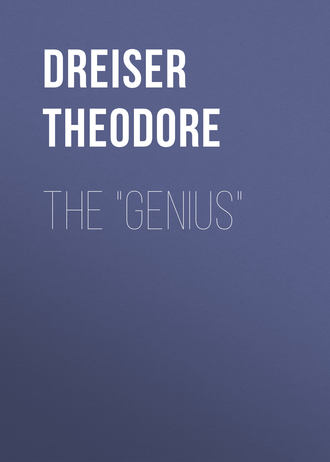 полная версия
полная версияThe "Genius"
"Why should I be disturbed? Why should I? Can you sit in this office, you a man in charge of all this vast public work, and ask me in cold blood why I should be disturbed? And my daughter's very life at stake. Why should I be disturbed and my daughter only out of her short dresses a little while ago and practically innocent of the world. You dare to tell me that she proposed! Oh, you impervious scoundrel! To think I could be so mistaken in any human being. You, with your bland manners and your inconsistent talk of happy family life. I might have understood, though, when I saw you so often without your wife. I should have known. I did, God help me! but I didn't act upon it. I was taken by your bland, gentlemanly attitude. I don't blame poor, dear little Suzanne. I blame you, you utterly deceiving villain and myself for being so silly. I am being justly rewarded, however."
Eugene merely looked at her and drummed with his fingers.
"But I did not come here to bandy words with you," she went on. "I came to say that you must never see my daughter again, or speak of her, or appear where she might chance to be, though she won't be where you may appear, if I have my way, for you won't have a chance to appear anywhere in decent society very much longer. I shall go, unless you agree here and now never to see or communicate with her any more, to Mr. Colfax, whom I know personally, as you are aware, and lay the whole matter before him. I'm sure with what I know now of your record, and what you have attempted to do in connection with my daughter, and the condition of your wife, that he will not require your services very much longer. I shall go to Mr. Winfield, who is also an old friend, and lay the matter before him. Privately you will be drummed out of society and my daughter will be none the worse for it. She is so very young that when the facts are known, you are the only one who will bear the odium of this. Your wife has given me your wretched record only yesterday. You would like to make my Suzanne your fourth or fifth. Well, you will not. I will show you something you have not previously known. You are dealing with a desperate mother. Defy me if you dare. I demand that you write your farewell to Suzanne here and now, and let me take it to her."
Eugene smiled sardonically. Mrs. Dale's reference to Angela made him bitter. She had been there and Angela had talked of him – his past to her. What a mean thing to do. After all, Angela was his wife. Only the morning before, she had been appealing to him on the grounds of love, and she had not told him of Mrs. Dale's visit. Love! Love! What sort of love was this? He had done enough for her to make her generous in a crisis like this, even if she did not want to be.
"Write you a statement of release to Suzanne?" he observed, his lips curling – "how silly. Of course, I won't. And as for your threat to run to Mr. Colfax, I have heard that before from Mrs. Witla. There is the door. His office is twelve flights down. I'll call a boy, if you wish. You tell it to Mr. Colfax and see how much farther it goes before you are much older. Run to Mr. Winfield also. A lot I care about him or Mr. Colfax. If you want a grand, interesting discussion of this thing, just begin. It will go far and wide, I assure you. I love your daughter. I'm desperate about her. I'm literally crazy about her" – he got up – "she loves me, or I think she does. Anyhow, I'm banking all on that thought. My life from the point of view of affection has been a failure. I have never really been in love before, but I am crazy about Suzanne Dale. I am wild about her. If you had any sympathy for an unhappy, sympathetic, emotional mortal, who has never yet been satisfied in a woman, you would give her to me. I love her. I love her. By God!" – he banged the desk with his fist – "I will do anything for her. If she will come to me, Colfax can have his position, Winfield can have his Blue Sea Corporation. You can have her money, if she wants to give it to you. I can make a living abroad by my art, and I will. Other Americans have done it before me. I love her! I love her! Do you hear me? I love her, and what's more, I'm going to have her! You can't stop me. You haven't the brains; you haven't the strength; you haven't the resources to match that girl. She's brighter than you are. She's stronger, she's finer. She's finer than the whole current day conception of society and life. She loves me and she wants to give herself to me, willingly, freely, joyously. Match that in your petty society circles if you can. Society! You say you will have me drummed out of it, will you? A lot I care about your society. Hacks, mental light weights, money grubbers, gamblers, thieves, leeches – a fine lot! To see you sitting there and talking to me with your grand air makes me laugh. A lot I care for you. I was thinking of another kind of woman when I met you, not a narrow, conventional fool. I thought I saw one in you. I did, didn't I – not? You are like all the rest, a narrow, petty slavish follower after fashion and convention. Well," he snapped his fingers in her face, "go on and do your worst. I will get Suzanne in the long run. She will come to me. She will dominate you. Run to Colfax! Run to Winfield! I will get her just the same. She's mine. She belongs to me. She is big enough for me. The Gods have given her to me, and I will have her if I have to smash you and your home and myself and everyone else connected with me. I'll have her! I'll have her! She is mine! She is mine!" He lifted a tense hand. "Now you run and do anything you want to. Thank God, I've found one woman who knows how to live and love. She's mine!"
Mrs. Dale stared at him in amazement, scarcely believing her ears. Was he crazy? Was he really so much in love? Had Suzanne turned his brain? What an astonishing thing. She had never seen him anything like this – never imagined him capable of anything like it. He was always so quiet, smiling, bland, witty. Here he was dramatic, impassioned, fiery, hungry. There was a terrible light in his eyes and he was desperate. He must be in love.
"Oh, why will you do this to me?" she whimpered all at once. The terror of his mood conveying itself to her for the moment, and arousing a sympathy which she had not previously felt. "Why will you come into my home and attempt to destroy it? There are lots of women who will love you. There are lots more suited to your years and temperament than Suzanne. She doesn't understand you. She doesn't understand herself. She is just young, and foolish and hypnotized. You have hypnotized her. Oh, why will you do this to me? You are so much older than her, so much more schooled in life. Why not give her up? I don't want to go to Mr. Colfax. I don't want to speak to Mr. Winfield. I will, if I have to, but I don't want to. I have always thought so well of you. I know you are not an ordinary man. Restore my respect for you, my confidence in you. I can forgive, if I can't forget. You may not be happily married. I am sorry for you. I don't want to do anything desperate. I only want to save poor, little Suzanne. Oh, please! please! I love her so. I don't think you understand how I feel. You may be in love, but you ought to be willing to consider others. True love would. I know that she is hard and wilful and desperate now, but she will change if you will help her. Why, if you really love her, if you have any sympathy for me or regard for her future, or your own, you will renounce your schemes and release her. Tell her you made a mistake. Write to her now. Tell her you can't do this and not socially ruin her and me and yourself, and so you won't do it. Tell her that you have decided to wait until time has made you a free man, if that is to be, and then let her have a chance of seeing if she will not be happy in a normal life. You don't want to ruin her at this age, do you? She is so young, so innocent. Oh, if you have any judgment of life at all, any regard, any consideration, anything, I beg of you; I beg as her mother, for I love her. Oh!" Tears came into her eyes again and she cried weakly in her handkerchief.
Eugene stared at her. What was he doing? Where was he going? Was he really as bad as he appeared to be here? Was he possessed? Was he really so hard-hearted? Through her grief and Angela's and the threats concerning Colfax and Winfield, he caught a glimpse of the real heart of the situation. It was as if there had been a great flash of lightning illuminating a black landscape. He saw sympathetically, sorrow, folly, a number of things that were involved, and then the next moment, it was gone. Suzanne's face came back, smooth, classic, chiseled, perfectly modeled, her beauty like a tightened bow; her eyes, her lips, her hair, the gaiety and buoyancy of her motions and her smile. Give her up! Give up Suzanne and that dream of the studio, and of joyous, continuous, delicious companionship? Did Suzanne want him to? What had she said over the phone? No! No! No! Quit now, and her clinging to him. No! No! No! Never!! He would fight first. He would go down fighting. Never! Never! Never!
His brain seethed.
"I can't do it," he said, getting up again, for he had sat down after his previous tirade. "I can't do it. You are asking something that is utterly impossible. It can never be done. God help me, I'm insane, I'm wild over her. Go and do anything you want to, but I must have her and I will. She's mine! She's mine! She's mine!"
His thin, lean hands clenched and he clicked his teeth.
"Mine, mine, mine!" he muttered, and one would have thought him a villain in a cheap melodrama.
Mrs. Dale shook her head.
"God help us both!" she said. "You shall never, never have her. You are not worthy of her. You are not right in your mind. I will fight you with all the means in my power. I am desperate! I am wealthy. I know how to fight. You shall not have her. Now we will see which will win." She rose to go and Eugene followed her.
"Go ahead," he said calmly, "but in the end you lose. Suzanne comes to me. I know it. I feel it. I may lose many other things, but I get her. She's mine."
"Oh," sighed Mrs. Dale wearily, half believing him and moving towards the door. "Is this your last word?"
"It is positively."
"Then I must be going."
"Good-bye," he said solemnly.
"Good-bye," she answered, white faced, her eyes staring.
She went out and Eugene took up the telephone; but he remembered that Suzanne had warned him not to call, but to depend on her. So he put it down again.
CHAPTER XV
The fire and pathos of Mrs. Dale's appeal should have given Eugene pause. He thought once of going after her and making a further appeal, saying that he would try and get a divorce eventually and marry Suzanne, but he remembered that peculiar insistency of Suzanne on the fact that she did not want to get married. Somehow, somewhere, somewhy, she had formulated this peculiar ideal or attitude, which whatever the world might think of it, was possible of execution, providing he and she were tactful enough. It was not such a wild thing for two people to want to come together in this way, if they chose, he thought. Why was it? Heaven could witness there were enough illicit and peculiar relationships in this world to prevent society from becoming excited about one more, particularly when it was to be conducted in so circumspect and subtle a way. He and Suzanne did not intend to blazon their relationship to the world. As a distinguished artist, not active, but acknowledged and accomplished, he was entitled to a studio life. He and Suzanne could meet there. Nothing would be thought of it. Why had she insisted on telling her mother? It could all have been done without that. There was another peculiar ideal of hers, her determination to tell the truth under all circumstances. And yet she had really not told it. She had deceived her mother a long time about him simply by saying nothing. Was this some untoward trick of fate's, merely devised to harm him? Surely not. And yet Suzanne's headstrong determination seemed almost a fatal mistake now. He sat down brooding over it. Was this a terrific blunder? Would he be sorry? All his life was in the balance. Should he turn back?
No! No! No! Never! It was not to be. He must go on. He must! He must! So he brooded.
The next of Mrs. Dale's resources was not quite so unavailing as the others, though it was almost so. She had sent for Dr. Latson Woolley, her family physician – an old school practitioner of great repute, of rigid honor and rather Christian principles himself, but also of a wide intellectual and moral discernment, so far as others were concerned.
"Well, Mrs. Dale," he observed, when he was ushered into her presence in the library on the ground floor, and extending his hand cordially, though wearily, "what can I do for you this morning?"
"Oh, Dr. Woolley," she began directly, "I am in so much trouble. It isn't a case of sickness. I wish it were. It is something so much worse. I have sent for you because I know I can rely on your judgment and sympathy. It concerns my daughter, Suzanne."
"Yes, yes," he grunted, in a rather crusty voice, for his vocal cords were old, and his eyes looked out from under shaggy, gray eyebrows which somehow bespoke a world of silent observation. "What's the matter with her? What has she done now that she ought not to do?"
"Oh, doctor," exclaimed Mrs. Dale nervously, for the experiences of the last few days had almost completely dispelled her normal composure, "I don't know how to tell you, really. I don't know how to begin. Suzanne, my dear precious Suzanne, in whom I have placed so much faith and reliance has, has – "
"Well, tell me," interrupted Dr. Woolley laconically.
When she had told him the whole story, and answered some of his incisive questions, he said:
"Well, I am thinking you have a good deal to be grateful for. She might have yielded without your knowledge and told you afterwards – or not at all."
"Not at all. Oh, doctor! My Suzanne!"
"Mrs. Dale, I looked after you and your mother before you and Suzanne. I know something about human nature and your family characteristics. Your husband was a very determined man, as you will remember. Suzanne may have some of his traits in her. She is a very young girl, you want to remember, very robust and vigorous. How old is this Witla man?"
"About thirty-eight or nine, doctor."
"Um! I suspected as much. The fatal age. It's a wonder you came through that period as safely as you did. You're nearly forty, aren't you?"
"Yes, doctor, but you're the only one that knows it."
"I know, I know. It's the fatal age. You say he is in charge of the United Magazines Corporation. I have probably heard of him. I know of Mr. Colfax of that company. Is he very emotional in his temperament?"
"I had never thought so before this."
"Well, he probably is. Thirty-eight to thirty-nine and eighteen or nineteen – bad combination. Where is Suzanne?"
"Upstairs in her room, I fancy."
"It might not be a bad thing if I talked to her myself a little, though I don't believe it will do any good."
Mrs. Dale disappeared and was gone for nearly three-quarters of an hour. Suzanne was stubborn, irritable, and to all preliminary entreaties insisted that she would not. Why should her mother call in outsiders, particularly Dr. Woolley, whom she knew and liked. She suspected at once when her mother said Dr. Woolley wanted to see her that it had something to do with her case, and demanded to know why. Finally, after much pleading, she consented to come down, though it was with the intention of showing her mother how ridiculous all her excitement was.
The old doctor who had been meditating upon the inexplicable tangle, chemical and physical, of life – the blowing hither and thither of diseases, affections, emotions and hates of all kinds, looked up quizzically as Suzanne entered.
"Well, Suzanne," he said genially, rising and walking slowly toward her, "I'm glad to see you again. How are you this morning?"
"Pretty well, doctor, how are you?"
"Oh, as you see, as you see, a little older and a little fussier, Suzanne, making other people's troubles my own. Your mother tells me you have fallen in love. That's an interesting thing to do, isn't it?"
"You know, doctor," said Suzanne defiantly, "I told mama that I don't care to discuss this, and I don't think she has any right to try to make me. I don't want to and I won't. I think it is all in rather poor taste."
"Poor taste, Suzanne?" asked Mrs. Dale. "Do you call our discussion of what you want to do poor taste, when the world will think that what you want to do is terrible when you do it?"
"I told you, mama, that I was not coming down here to discuss this thing, and I'm not!" said Suzanne, turning to her mother and ignoring Dr. Woolley. "I'm not going to stay. I don't want to offend Dr. Woolley, but I'm not going to stay and have you argue this all over again."
She turned to go.
"There, there, Mrs. Dale, don't interrupt," observed Dr. Woolley, holding Suzanne by the very tone of his voice. "I think myself that very little is to be gained by argument. Suzanne is convinced that what she is planning to do is to her best interest. It may be. We can't always tell. I think the best thing that could be discussed, if anything at all in this matter can be discussed, is the matter of time. It is my opinion that before doing this thing that Suzanne wants to do, and which may be all right, for all I know, it would be best if she would take a little time. I know nothing of Mr. Witla. He may be a most able and worthy man. Suzanne ought to give herself a little time to think, though. I should say three months, or six months. A great many after effects hang on this decision, as you know," he said, turning to Suzanne. "It may involve responsibilities you are not quite ready to shoulder. You are only eighteen or nineteen, you know. You might have to give up dancing and society, and travel, and a great many things, and devote yourself to being a mother and ministering to your husband's needs. You expect to live with him permanently, don't you?"
"I don't want to discuss this, Dr. Woolley."
"But you do expect that, don't you?"
"Only as long as we love each other."
"Um, well, you might love him for some little time yet. You rather expect to do that, don't you?"
"Why, yes, but what is the good of this, anyhow? My mind is made up."
"Just the matter of thinking," said Dr. Woolley, very soothingly and in a voice which disarmed Suzanne and held her. "Just a little time in which to be absolutely sure. Your mother is anxious not to have you do it at all. You, as I understand it, want to do this thing right away. Your mother loves you, and at bottom, in spite of this little difference, I know you love her. It just occurred to me that for the sake of good feeling all around, you might like to strike a balance. You might be willing to take, say six months, or a year and think about it. Mr. Witla would probably not object. You won't be any the less delightful to him at the end of that time, and as for your mother, she would feel a great deal better if she thought that, after all, what you decided to do you had done after mature deliberation."
"Yes," exclaimed Mrs. Dale, impulsively, "do take time to think, Suzanne. A year won't hurt you."
"No," said Suzanne unguardedly. "It is all a matter of whether I want to or not. I don't want to."
"Precisely. Still this is something you might take into consideration. The situation from all outside points of view is serious. I haven't said so, but I feel that you would be making a great mistake. Still, that is only my opinion. You are entitled to yours. I know how you feel about it, but the public is not likely to feel quite the same. The public is a wearisome thing, Suzanne, but we have to take it into consideration."
Suzanne stared stubbornly and wearily at her tormentors. Their logic did not appeal to her at all. She was thinking of Eugene and her plan. It could be worked. What did she care about the world? During all this talk, she drew nearer and nearer the door and finally opened it.
"Well, that is all," said Dr. Woolley, when he saw she was determined to go. "Good morning, Suzanne. I am glad to have seen you again."
"Good morning, Dr. Woolley," she replied.
She went out and Mrs. Dale wrung her hands. "I wish I knew what was to be done," she exclaimed, gazing at her counselor.
Dr. Woolley brooded over the folly of undesired human counsel.
"There is no need for excitement," he observed after a time. "It is obvious to me that if she is handled rightly, she will wait. She is in a state of high strung opposition and emotion for some reason at present. You have driven her too hard. Relax. Let her think this thing out for herself. Counsel for delay, but don't irritate. You cannot control her by driving. She has too stern a will. Tears won't help. Emotion seems a little silly to her. Ask her to think, or better yet, let her think and plead only for delay. If you could get her away for two or three weeks or months, off by herself undisturbed by your pleadings and uninfluenced by his – if she would ask him of her own accord to let her alone for that time, all will be well. I don't think she will ever go to him. She thinks she will, but I have the feeling that she won't. However, be calm. If you can, get her to go away."
"Would it be possible to lock her up in some sanatorium or asylum, doctor, until she has had time to think?"
"All things are possible, but I should say it would be the most inadvisable thing you could do. Force accomplishes nothing in these cases."
"I know, but suppose she won't listen to reason?"
"You really haven't come to that bridge yet. You haven't talked calmly to her yet. You are quarreling with her. There is very little in that. You will simply grow further and further apart."
"How practical you are, doctor," observed Mrs. Dale, in a mollified and complimentary vein.
"Not practical, but intuitional. If I were practical, I would never have taken up medicine."
He walked to the door, his old body sinking in somewhat upon itself. His old, gray eyes twinkled slightly as he turned.
"You were in love once, Mrs. Dale," he said.
"Yes," she replied.
"You remember how you felt then?"
"Yes."
"Be reasonable. Remember your own sensations – your own attitude. You probably weren't crossed in your affair. She is. She has made a mistake. Be patient. Be calm. We want to stop it and no doubt can. Do unto others as you would be done by."
He ambled shufflingly across the piazza and down the wide steps to his car.
"Mama," she said, when after Dr. Woolley had gone her mother came to her room to see if she might not be in a mellower mood, and to plead with her further for delay, "it seems to me you are making a ridiculous mess of all this. Why should you go and tell Dr. Woolley about me! I will never forgive you for that. Mama, you have done something I never thought you would do. I thought you had more pride – more individuality."
One should have seen Suzanne, in her spacious boudoir, her back to her oval mirrored dressing table, her face fronting her mother, to understand her fascination for Eugene. It was a lovely, sunny, many windowed chamber, and Suzanne in a white and blue morning dress was in charming accord with the gay atmosphere of the room.
"Well, Suzanne, you know," she said, rather despondently, "I just couldn't help it. I had to go to someone. I am quite alone apart from you and Kinroy and the children" – she referred to Adele and Ninette as the children when talking to either Suzanne or Kinroy – "and I didn't want to say anything to them. You have been my only confidant up to now, and since you have turned against me – "
"I haven't turned against you, mama."
"Oh, yes you have. Let's not talk about it, Suzanne. You have broken my heart. You are killing me. I just had to go to someone. We have known Dr. Woolley so long. He is so good and kind."
"Oh, I know, mama, but what good will it do? How can anything he might say help matters? He isn't going to change me. You're only telling it to somebody who oughtn't to know anything about it."
"But I thought he might influence you," pleaded Mrs. Dale. "I thought you would listen to him. Oh, dear, oh, dear. I'm so tired of it all. I wish I were dead. I wish I had never lived to see this."
"Now there you go, mama," said Suzanne confidently. "I can't see why you are so distressed about what I am going to do. It is my life that I am planning to arrange, not yours. I have to live my life, mama, not you."









